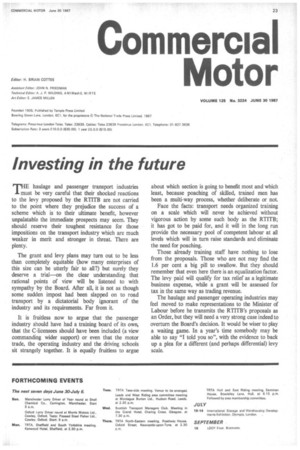Investing in the future
Page 25

If you've noticed an error in this article please click here to report it so we can fix it.
E haulage and passenger transport industries must be very careful that their shocked reactions to the levy proposed by the RTITB are not carried to the point where they prejudice the success of a scheme which is to their ultimate benefit, however unpalatable the immediate prospects may seem. They should reserve their toughest resistance for those impositions on the transport industry which are much weaker in merit and stronger in threat. There are plenty.
The grant and levy plans may turn out to be less than completely equitable (how many enterprises of this size can be utterly fair to all?) but surely they deserve a trial—on the clear understanding that rational points of view will be listened to with sympathy by the Board. After all, it is not as though some sudden impost had been slapped on to road transport by a dictatorial body ignorant of the industry and its requirements. Far from it.
It is fruitless now to argue that the passenger industry should have had a training board of its own, that the C-licensees should have been included (a view commanding wider support) or even that the motor trade, the operating industry and the driving schools sit strangely together. It is equally fruitless to argue about which section is going to benefit most and which least, because poaching of skilled, trained men has been a multi-way process, whether deliberate or not.
Face the facts: transport needs organized training on a scale which will never be achieved without vigorous action by some such body as the RTITE; it has got to be paid for, and it will in the long run provide the necessary pool of competent labour at all levels which will in turn raise standards and eliminate the need for poaching.
Those already training staff have nothing to lose from the proposals. Those who are not may find the 1.6 per cent a big pill to swallow. But they should remember that even here there is an equalization factor. The levy paid will qualify for tax relief as a legitimate business expense, while a grant will be assessed for tax in the same way as trading revenue.
The haulage and passenger operating industries may feel moved to make representations to the Minister of Labour before he transmits the RTITB's proposals as an Order, but they will need a very strong case indeed to overturn the Board's decision. It would be wiser to play a waiting game. In a year's time somebody may be able to say "I told you so", with the evidence to back up a plea for a different (and perhaps differential) levy scale.
























































































































